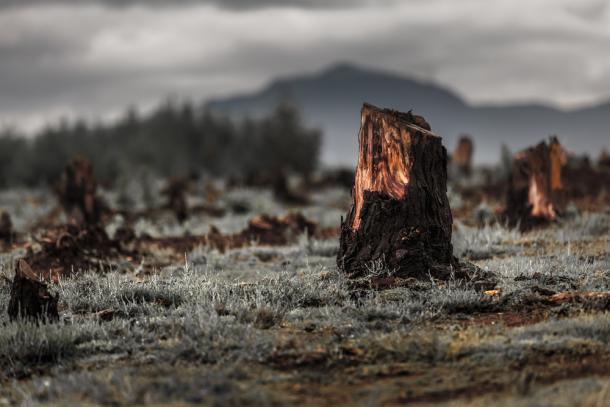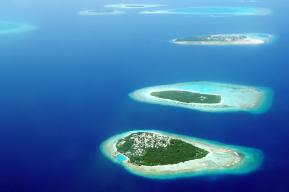Article
Juliette Binoche and Marie-Monique Robin: “It's too late to be pessimistic”
During a special premiere on April 22 at UNESCO headquarters in Paris, The UNESCO Courier had the opportunity to talk to Marie-Monique Robin and the French actress Juliette Binoche, who took part in the documentary.

Interview by Mila Ibrahimova
Several studies and scientists have shown the link between biodiversity loss and the emergence of diseases. Why do you think we didn’t listen to these warning signals?
Marie-Monique Robin: For my book and documentary Making Pandemics, I interviewed sixty-two scientists who have been sounding the alarm for many, many years. There are indeed hundreds of studies showing the link between biodiversity loss and the emergence of infectious diseases. The scientists I interviewed came from very diverse disciplines: parasitologists, virologists, biologists, ecologists. They have highlighted the main drivers behind those emergences, such as deforestation, especially in the tropical areas, intensive breeding and globalization. As an example, when we cut down trees, we allow pathogens carried by wild animals to get in touch with humans, and this could provoke what we call a “spillover”. So why did we ignore the scientific facts? I think the value of biodiversity, which is a common home for all the organisms living on this very beautiful blue planet, is really downplayed, belittled and underestimated. We didn’t really realize the importance of what the ecosystems and biodiversity, especially rainforests, provide to Mankind.
What inspired you to be part of the documentary?
Juliette Binoche: What inspired me is the subject matter: understanding and knowing what the link is between pandemics and the destruction of biodiversity. Second, I was inspired by Marie-Monique Robin, who is the director. I had seen some of her films, documentaries: she is an amazing investigative journalist. You know, I had to convince her to take part in the documentary, as she didn’t think I’d travel that much with her to encounter all the scientists. But once she was persuaded, I was thrilled to go around the world and do interviews with those ecologists – “écologues de la santé”.
I felt that biodiversity was a fundamental issue and very little known, compared to climate change.
How can environmental films/documentaries make an impact to protect biodiversity?
Robin: I have been making films and books for forty years, and my goal has always been to bring serious scientific arguments to a large public – which obviously includes institutions, governments, associations, as well as citizens – so that they can act. I felt that biodiversity was a fundamental issue and very little known, compared to climate change. We brought together thirty-two partners; there are television channels which will broadcast the film, UNESCO which is a partner, but also research organizations such as the IRD (the French National Research Institute for Sustainable Development), as well as NGOs, foundations, Atlanta’s Emory University, and a lot of citizens who participated in a crowdfunding initiative. We did this because we said to ourselves that this film must be used; people have to be able to take it and debate it. In France, and also in other parts of the world, people are mobilized to protect biodiversity. They are not often heard, and they need tools too.
What was your objective for the documentary?
Robin: It is about scientists talking to an artist, Juliette Binoche, who is a kind of guiding light, our “Candide”... with the objective that the film may become a tool for education, in the broadest sense of the term. I have made films and books that have had a lot of impact, and I think that they sometimes come at the right time and correspond to a need. I saw it with the book that I made before the film (Making Pandemics), which has worked very well because people need to understand what is going on. “Is it a fatality?”, they wonder. No, it isn’t a fatality because when scientists tell you that infectious diseases emerge from causes, well if there are such causes then it must be possible to act. So I hope this film will be useful.
I was fascinated by one particular mechanism, which is the “dilution effect” mentioned in the film.
What have you learned from your commitment to protect biodiversity?
Binoche: In a way, it has been more like recognition than learning. Recognising what feels right to you when you’re listening to people who know about the mechanisms of biodiversity – so it becomes “yes of course, this is this and because of that” and there is a logical sense of how it’s all happening. And they’re very good teachers as well, those scientists. Because I didn’t know anything, they had to go very slowly, so I could understand every single step of these mechanisms. Marie-Monique had written a book too, before we went traveling around and meeting those scientists, in which all of this is very well developed and explained. So that was a great reference for me, I could go back to it and ask Marie-Monique questions. I think that is one of the specific qualities of this film.
You have traveled the world to film the documentary. What have you learned from the people you met along the way?
Binoche: I was fascinated by one particular mechanism mentioned in the film, the “dilution effect”. It helps us to understand that species diversity is important because it allows a balance between predators and “invisible animals”. This “dilution effect” protects us, whereas if we fragment forests, the animals no longer have the space to live, they no longer have the food they need, they are stressed… and there is a whole mechanism that starts then, where viruses appear. So obviously, it’s more complex than what I just explained, but it’s one of the main principles that health scientists explain in the film. The UN created “One Health”, which is an organization designed to invite different experts, as well as people who are not necessarily scientists but who have an understanding of humans, animals and their environment, so that they can exchange their knowledge to allow us to move forward and have a more global, more holistic vision of the Living.
We are in the middle of the sixth extinction of species
Is it still possible to act and if so, how?
Robin: Of course, we have to hope that it is still time to act. Besides, if I didn't think so, I don't think it would be worth making this kind of film anymore. I must say that I have traveled a lot in the past forty years; frankly, we are in an emergency situation and we must really be aware of it. The last IPCC report tells us that we only have three years left. Regarding biodiversity, we are in the middle of the sixth extinction of species; let me remind you that the last one, the fifth, took place 65 million years ago. Do you realize what we, human beings, are capable of doing in a few millennia? So, we must act. It's too late to be pessimistic; we have to say to ourselves that we're going to get there.
What can we do?
Robin: It is absolutely necessary to convince people that it is urgent to act, and to act with measures that aim to protect the climate, biodiversity and health in a holistic, global vision. This, for instance, means that we should no longer import transgenic soya from Argentina, which may arrive in the port of Lorient in Brittany to then feed the pigs of the intensive Breton farms, for example; when we do that we obviously contribute to deforestation in Argentina. As a result, there are climatic disturbances. I filmed it, I saw it. Most importantly, we must rethink governance; we really need international organizations to regain their importance, because if we want this holistic vision, which reconnects the health of ecosystems, the health of wild animals and the health of humans, then we need places where we can develop this common vision.









